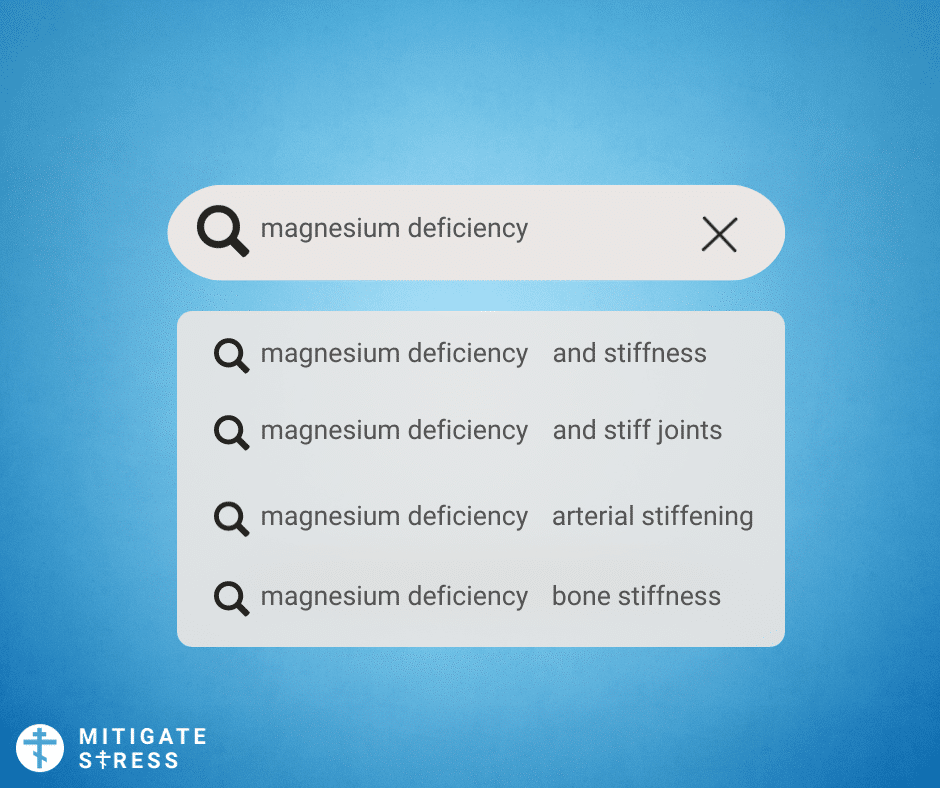Magnesium is a key mineral that is involved in over 300 biochemical reactions within our bodies1. This includes crucial functions such as nerve and muscle function, blood pressure regulation, and immune system support. However, when our bodies are deficient in magnesium, we may experience several health issues. One of these potential issues is stiffness2.
Understanding Stiffness
Stiffness is often characterized by a decrease in the flexibility or range of motion of a joint or set of joints. It can result in discomfort, reduced mobility, and in severe cases, significant pain3.
Unraveling the Relationship Between Stiffness and Magnesium Deficiency
Scientific research has made significant strides in understanding the relationship between stiffness and magnesium deficiency. A study published in the journal MDPI discussed the role of magnesium deficiency in promoting atherosclerosis, endothelial dysfunction, and arterial stiffening4.
Another study in the Online Library discovered a correlation between serum magnesium levels and vascular stiffness in patients undergoing maintenance hemodialysis. The researchers suggested that oxidative stress in endothelial cells due to magnesium deficiency might contribute to vascular injury5.
Additionally, a long-term moderate magnesium-deficient diet was found to exacerbate cardiovascular risks associated with aging and increase mortality in rats, according to a study published in the Journal of Hypertension6. This diet also increased arterial stiffness, further reinforcing the connection between magnesium deficiency and stiffness.
Deciphering Magnesium’s Role in Muscle and Bone Health
Magnesium plays an integral role in maintaining healthy muscle and bone function. It is involved in nerve transmission and muscle contraction, both of which are essential for proper muscle activity7. When magnesium levels are low, these processes could be disrupted, potentially leading to conditions like stiffness8.
Furthermore, studies have also highlighted the impact of magnesium deficiency on bone health. Research published in the Journal of the American College of Nutrition and Science Direct found that prolonged magnesium deficiency could lead to osteoporosis in rats9,10. This condition is often associated with increased bone stiffness.
Empowering Your Health: The Role of Magnesium
Given the potential link between magnesium deficiency and stiffness, maintaining optimal magnesium levels emerges as a proactive measure towards enhancing muscle and bone health. Incorporating more magnesium into your diet can be done in a variety of ways, such as consuming magnesium-rich foods like nuts, seeds, and green leafy vegetables, or considering magnesium supplements.
Sometimes diet alone is not enough to increase or maintain optimal magnesium levels. That’s where our products come into play:
Magnesium Bicarbonate Products: Our magnesium bicarbonate products are designed with your health in mind. They are highly bioavailable, which means they can be easily absorbed by the body. Incorporating these products into your everyday routine can significantly boost your overall magnesium levels, thereby bolstering your muscle health.
Topical Magnesium Oil: Our topical magnesium oil offers another effective avenue for augmenting your magnesium levels. When applied directly to the skin, it allows for transdermal absorption, delivering magnesium directly to where it’s needed most.
In conclusion, while further research is needed to fully comprehend the connection between magnesium deficiency and stiffness, current findings suggest that maintaining optimal magnesium levels could play an integral role in managing this condition. By focusing on maintaining a balanced diet and considering magnesium supplementation if necessary, you can contribute significantly to your overall well-being and muscle and bone health.






0 Comments